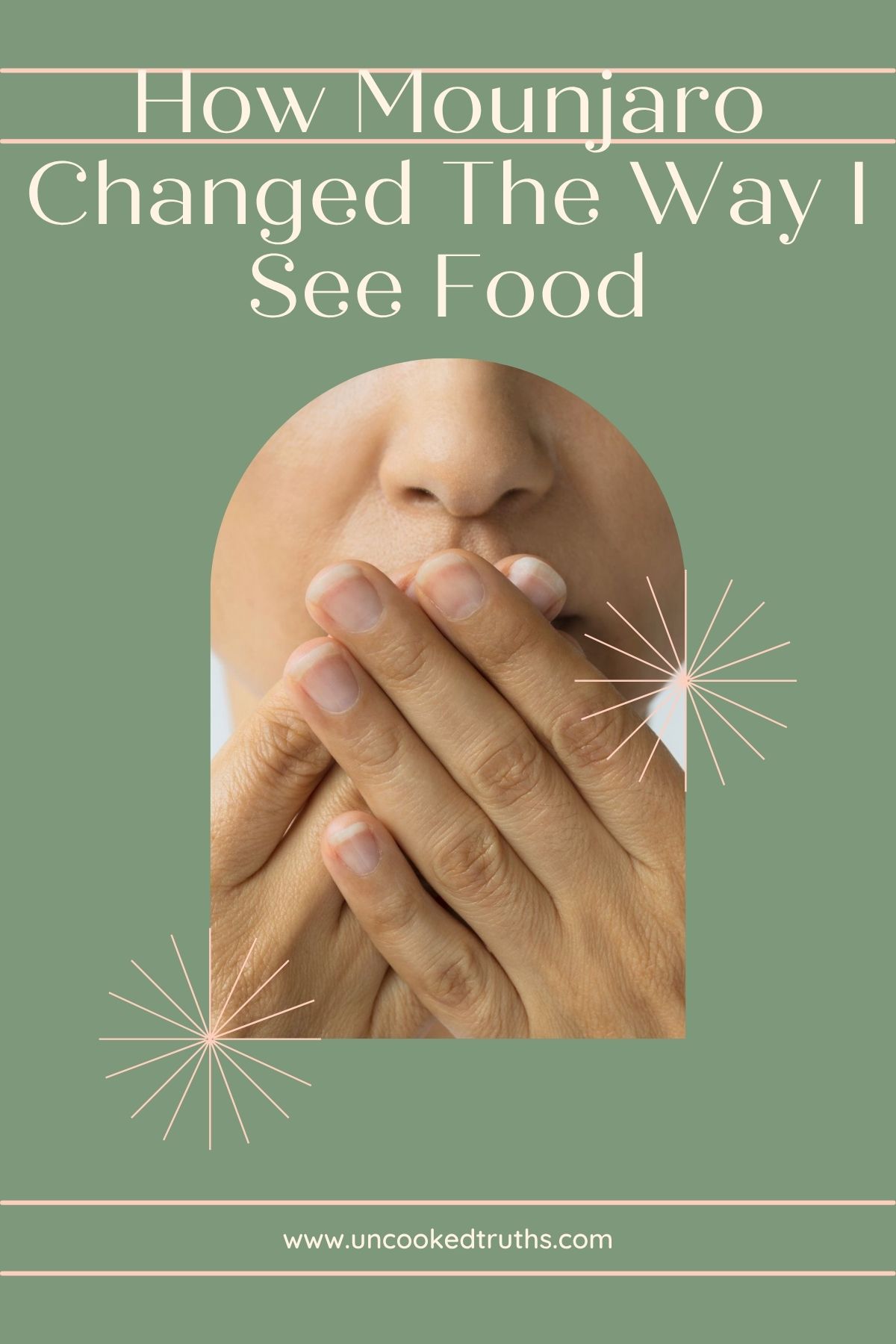For over a decade, food was my world. Besides this blog, I also was and am a food blogger, and built a business and a life around clean, flavorful recipes. I cooked from scratch, avoided processed foods, and celebrated the kind of cooking that remembered where it came from. My sweets were European, not overly sugary or dyed neon pink. My savory dishes were rooted in tradition. I cooked from memory, with meaning.
Then I started Mounjaro. And everything shifted.

From the beginning, I want to mention that what you are about to read is purely my experience with food and appetite on Mounjaro. This article is meant to bring awareness and not medical advice, so please talk to your doctor or nutritionist about your personal journey.
Jump to:
When Food Becomes Fuel, Not Joy
I didn’t expect this medication to affect my relationship with food so deeply. I knew it would help with insulin resistance, blood sugar, and appetite. But I wasn’t prepared for the emotional fallout. The cravings disappeared. But so did the spark.
Note: If you’re new to GLP-1s like Mounjaro, I wrote more about who they’re really for, and why it’s not just about diabetes.
I stopped wanting to cook. Grocery shopping felt like walking into a discount store where nothing looked good. My kitchen, once my creative space, started to feel irrelevant. And it wasn’t about willpower. It was biology. My appetite simply vanished, and with it went the pleasure, the pull, and even the memories that used to guide my meals.
Appetite Was Never Just About Hunger
Before Mounjaro, my kitchen was an extension of myself. My recipes were filled with childhood memories and cultural meaning. Sour cherry cake. Cabbage rolls. The smell of fresh dill and garlic in the pan. But once my appetite disappeared, that emotional pull vanished too.
Some days I didn’t want to cook at all. Some days I couldn’t stand the thought of food. I dropped carbs and sugar completely, not by willpower, but because my body just couldn’t tolerate them anymore. My husband started doing most of the cooking, because I couldn’t bring myself to care. And that disconnection wasn’t just about food. It felt like a piece of me had gone quiet.
It looks like dopamine is that lovely chemical behind motivation, reward, and pleasure and with the GLP-1 medications, especially if you are on a high dose, some people describe feeling emotionally flat, low energy, or “blah.”
What Hunger Looks Like on Mounjaro
The only predictable pattern was this: around day five or six after the injection, a flicker of interest might return. A soft signal of hunger. That was my window, if I wanted to cook, eat something meaningful, or just feel human again. Sometimes I’d cook something small. Sometimes I wouldn’t. But hunger on Mounjaro isn’t hunger like it used to be.
There was no anticipation, no joy, no desire. Hunger became functional. Eat enough to move through the day, then forget about it.
Why This Matters More Than People Think
People talk a lot about losing food noise on GLP-1s. And yes, it’s a relief to no longer be constantly thinking about eating. Think about me, I was breathing recipes day and night, I was surrounded by books, ideas, ingredients and the next recipe project.
But there’s a flip side, especially for those of us who built identity, careers, and connection around food. When appetite disappears, it can feel like you’re losing something more than hunger. You’re losing routine, pleasure, and sometimes even a sense of self. It is not a bad feeling, but it is different.
What Helps When Food Doesn’t Feel Good Anymore
Here’s what I’ve found actually helps during the flatline.
1. Keep a Few “Safe Foods” on Rotation
Have 3–5 go-to options you can tolerate even when nothing appeals. Mine include:
- Full-fat Greek yogurt with a drizzle of honey
- Bone broth with collagen
- Hard Boiled Eggs
- Protein shakes with fiber that could include blueberries, strawberries, sometimes a banana, flax seeds etc.
These aren’t exciting. They’re reliable. And sometimes, that’s enough.
2. Let Food Be Functional
Stop waiting to feel inspired. Ask yourself: What do I need to eat to get through this day?
Use food to support your energy, your focus, and your goals. As my taste changed, I still eat what looks or sounds good in that moment. Funny thing, I would rather eat broccoli and some grilled chicken than a piece of cake. 🙂
3. Outsource the Decisions
If meal planning feels like a burden, delegate it. Let someone else cook. Use a meal delivery service. Buy prepped groceries online and avoid the store entirely. The less friction, the better.
4. Cook on the Days You Can
When your appetite returns mid-week, use that time. Roast some vegetables. Bake a frittata. Prep a pot of soup or portion a few meals into containers. Future-you will be grateful when the fog sets back in.
5. Drink Your Nutrition
On low days, solid food may be too much. Smoothies, soups, and protein drinks can cover your bases. Add powdered greens, collagen, or nut butters to make them more complete. This isn’t about being ideal. It’s about being fed. You need nutrients, so you don't lose muscle, faint on the street, or suffer from hair loss.
I go deeper into how I’m maintaining muscle during midlife, even without a traditional workout routine.
FAQ: Appetite, GLP-1s, and the Emotional Fallout
Yes. Mounjaro slows gastric emptying and suppresses hunger hormones. Most people on GLP-1 medications experience a dramatic reduction in cravings and hunger cues. There is almost no food noise.
The medication affects how your brain responds to food and how slowly it moves through your stomach. That can create aversions or indifference toward foods you used to enjoy.
Some people notice it return around day five or six after the injection. Others feel flat for weeks. It varies by dose, body chemistry, and duration of treatment.
Focus on small portions of high-protein, easy-to-digest foods. Try not to skip meals altogether, especially if you're physically active or managing blood sugar. This also helps with nausea.
Absolutely. For some, it feels like a loss, especially if food was tied to comfort or identity. For others, it's a relief to finally be free from constant food thoughts. Either way, it’s a common shift on Mounjaro, and it takes time to adjust.
You Might Also Like
- Who Really Benefits from GLP-1s?
- Midlife Body Mysteries and Strange New Symptoms
- How I’m Staying Strong Without Loving Exercise
- HRT and Mounjaro: Finding Balance in Midlife
- Menopause Support for Husbands: What You Need to Know






Leave a Reply